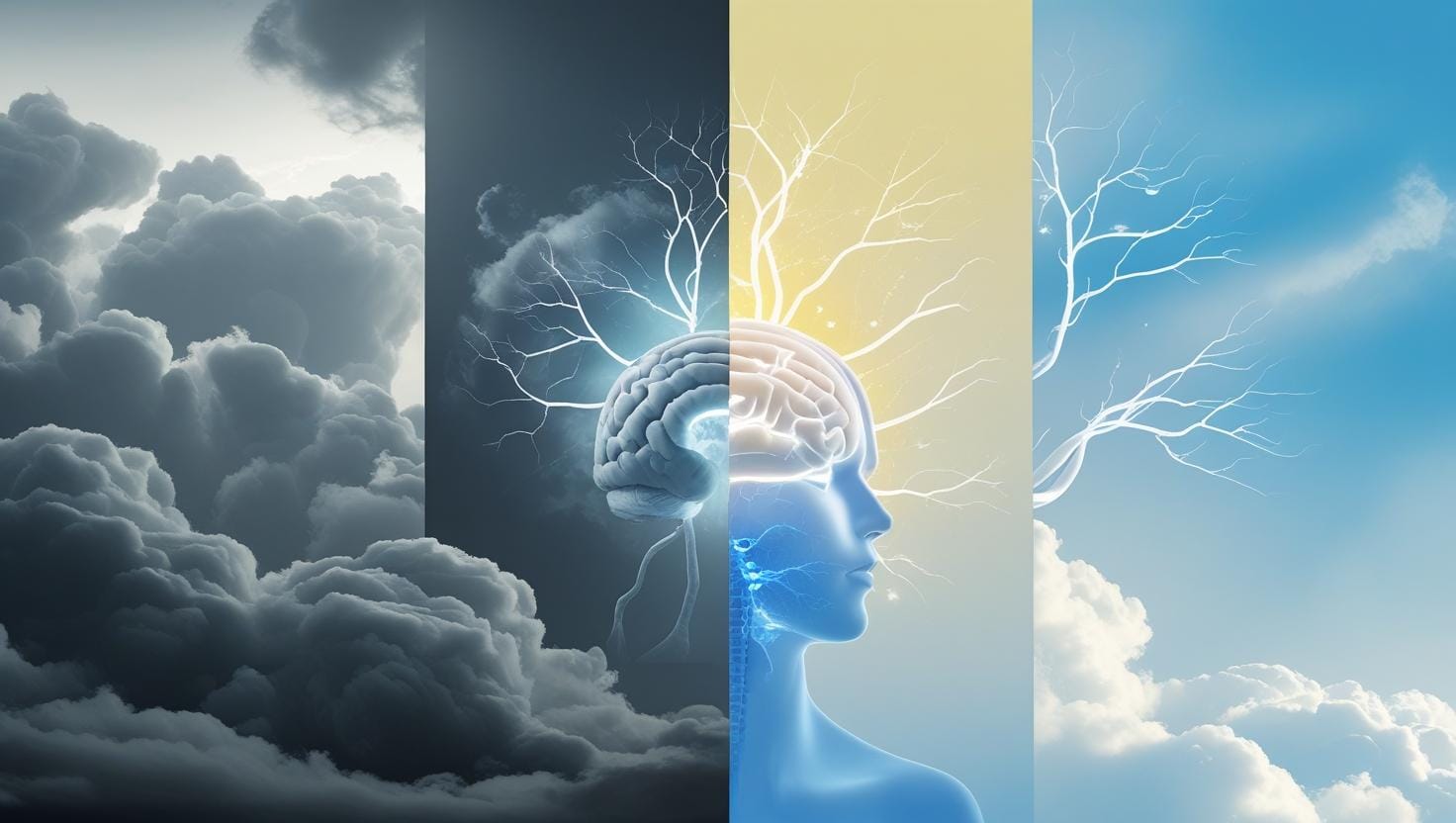Understanding Mood Disorders
Mood disorders affect millions but are highly treatable with proper psychiatric care
Bipolar Disorder
Experience of mood episodes ranging from depression to mania or hypomania
Persistent Mood Changes
Chronic mood symptoms that impact daily functioning and quality of life
Mixed Features
Complex presentations with both depressive and elevated mood symptoms
Recognizing Mood Disorder Symptoms
Mood disorders involve more than just mood changes
Depressive Episodes
- Persistent sadness or emptiness
- Loss of interest in activities
- Sleep and appetite changes
- Fatigue and low energy
- Difficulty concentrating
Manic/Hypomanic Episodes
- Elevated or irritable mood
- Decreased need for sleep
- Racing thoughts and speech
- Increased goal-directed activity
- Risk-taking behaviors

Comprehensive Mood Assessment
Dr. Lee provides thorough evaluation to accurately diagnose and treat mood disorders.
- Detailed mood episode history
- Pattern identification and tracking
- Medical and family history review
- Screening for related conditions
- Collaborative treatment planning

Evidence-Based Mood Stabilization
Modern treatments that help you achieve and maintain emotional balance.
- Mood stabilizing medications
- Careful medication management
- Sleep and circadian rhythm support
- Lifestyle and routine guidance
- Crisis prevention planning
Living Well with a Mood Disorder
With proper treatment, you can lead a stable, fulfilling life
Achieve Stability
Find the right treatment to maintain consistent mood and energy
Track Progress
Monitor mood patterns and identify early warning signs
Thrive Daily
Pursue goals and maintain relationships with confidence
Why Telepsychiatry Works for Mood Disorders
Consistent care is crucial for mood stability
Regular Monitoring
Easy scheduling ensures consistent appointments for optimal mood management
Flexible Access
Connect with Dr. Lee whether you’re feeling well or struggling with symptoms
Open Communication
Build trust and maintain treatment continuity from your comfort zone
Common Questions About Mood Disorders
How are mood disorders different from normal mood changes?
Mood disorders involve persistent, severe symptoms that significantly impact daily functioning, relationships, and quality of life, unlike typical mood fluctuations everyone experiences.
Can mood disorders be effectively treated?
Yes! With proper diagnosis and treatment, most people with mood disorders achieve significant symptom improvement and can lead stable, productive lives.
Will I need medication long-term?
Treatment duration varies by individual. Some people need long-term medication for stability, while others may eventually reduce or discontinue with careful monitoring.
Frequently Asked Questions About Mood Disorders Treatment
Expert insights from Dr. Ronald Lee, MD – Board-Certified Psychiatrist specializing in Bipolar & Mood Disorders
What is the difference between bipolar disorder and depression?
While depression involves persistent low mood, bipolar disorder includes episodes of both depression and
mania or hypomania. Mania involves elevated mood, increased energy, decreased need for sleep, and sometimes
impulsive behavior. Accurate diagnosis is crucial as treatment differs significantly – antidepressants alone
can trigger mania in bipolar disorder. Dr. Lee conducts comprehensive evaluations to ensure accurate diagnosis
and appropriate treatment planning.
What are the types of bipolar disorder?
Bipolar I involves full manic episodes lasting at least 7 days or requiring hospitalization.
Bipolar II features hypomanic episodes (less severe mania) alternating with major depression.
Cyclothymic disorder involves milder mood swings over at least 2 years. There’s also rapid cycling bipolar
with 4+ mood episodes per year. Dr. Lee specializes in identifying and treating all types through
careful assessment and monitoring via telepsychiatry.
How are mood disorders treated?
Treatment typically combines mood stabilizers (lithium, valproate, lamotrigine), antipsychotics,
or antidepressants, depending on the specific disorder and symptoms. Dr. Lee provides personalized
medication management, carefully monitoring effectiveness and side effects. Treatment also includes
psychoeducation about triggers, sleep hygiene, stress management, and recognizing early warning signs
of mood episodes to prevent relapse.
Can mood disorders be managed long-term?
Yes! With proper treatment, most people with mood disorders lead fulfilling, productive lives.
Long-term management involves consistent medication adherence, regular psychiatric monitoring,
lifestyle modifications, and developing coping strategies. Dr. Lee provides ongoing support through
convenient telepsychiatry appointments, adjusting treatment as needed to maintain stability and
prevent mood episodes.
What should I expect during a mood disorder evaluation?
Your comprehensive evaluation includes detailed mood history, including past episodes, triggers,
and patterns. Dr. Lee assesses sleep, energy, concentration, and any history of mania or hypomania.
Family history is important as mood disorders have genetic components. The 90-minute initial evaluation
via secure telepsychiatry ensures accurate diagnosis and personalized treatment planning.
How quickly do mood stabilizers work?
Response time varies by medication and individual. Some medications like antipsychotics may show
effects within days to weeks, while mood stabilizers like lithium or lamotrigine may take
several weeks to reach therapeutic levels. Dr. Lee closely monitors your response, adjusting
dosages as needed, and may use combination therapy for faster stabilization when appropriate.
Take Control of Your Mood Disorder
Expert bipolar and mood disorder treatment via telepsychiatry